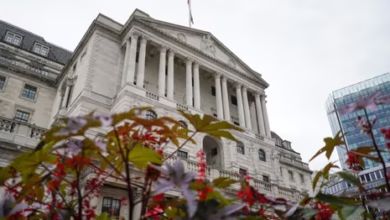Economic GrowthForex
European Central Bank Reports Deceleration in Wage Growth Across Euro Zone in Q4
Negotiated pay in the euro zone increased by 4.5% at the close of 2023, as reported by the European Central Bank (ECB), alleviating concerns of sustained inflation due to rising salaries.
Despite remaining elevated, the fourth-quarter pay growth decelerated from the euro-area record of 4.7% in the previous quarter, as revealed by the ECB’s negotiated wage indicator.
This quarterly gauge, analyzing non-harmonized country data, holds particular significance for policymakers in Frankfurt, who are closely monitoring labor costs to determine the opportune time for interest rate cuts.
The modest slowing in wage growth at the end of 2023 provides reassurance that the feared wage-price spiral may not unfold in the euro zone, according to Carsten Brzeski, the global head of macro at ING. However, decisions on rate cuts are expected to hinge on the first-quarter wage growth data for 2024, set to be released in May.
ECB President Christine Lagarde emphasized the significance of salaries as a driving force in inflation dynamics, cautioning against premature policy decisions without assurance of a return to the 2% inflation target.
While a forward-looking ECB tracker continues to signal strong wage pressures, agreements in the last quarter of 2023 suggest some leveling off.
In December, the ECB projected a gradual decline in nominal wage growth over time, expecting it to decrease from 5.3% in 2023 to 3.3% in 2026, measured in terms of compensation per employee.
The forecast anticipates limited pay increases as firms pass higher costs to consumers at a slower pace. However, differing perspectives exist, with some officials, like Austria’s Robert Holzmann, suggesting that companies may not absorb rising wage bills.
ECB Executive Board member Isabel Schnabel highlighted weak productivity as a factor exacerbating the effects of strong nominal wage growth on unit labor costs for firms. This raises concerns about firms passing higher pay costs to consumers, potentially delaying the return of inflation to the 2% target.
For the entirety of 2023, the ECB reported a negotiated wage increase of 4.5%, marking a significant uptick from 2.9% in 2022 and 1.4% in 2021.
From a technical viewpoint, the deceleration in negotiated wage growth may offer a delicate balance for policymakers, allowing for cautious optimism regarding inflationary pressures. However, the nuanced dynamics of wage growth, coupled with differing views on the extent to which firms can absorb increased labor costs, create complexities for the ECB’s monetary policy decisions.
As the market awaits further wage data in the coming quarters, the trajectory of negotiated pay will continue to play a pivotal role in shaping the central bank’s approach to interest rates and overall economic stability.
The nuanced picture of negotiated pay growth in the euro zone presents both reassurance and complexities for policymakers, offering insight into the delicate balance between inflation concerns and the need for economic stimulus.
The coming quarters will undoubtedly be critical in determining the trajectory of wage dynamics and their implications for the broader economic landscape.




